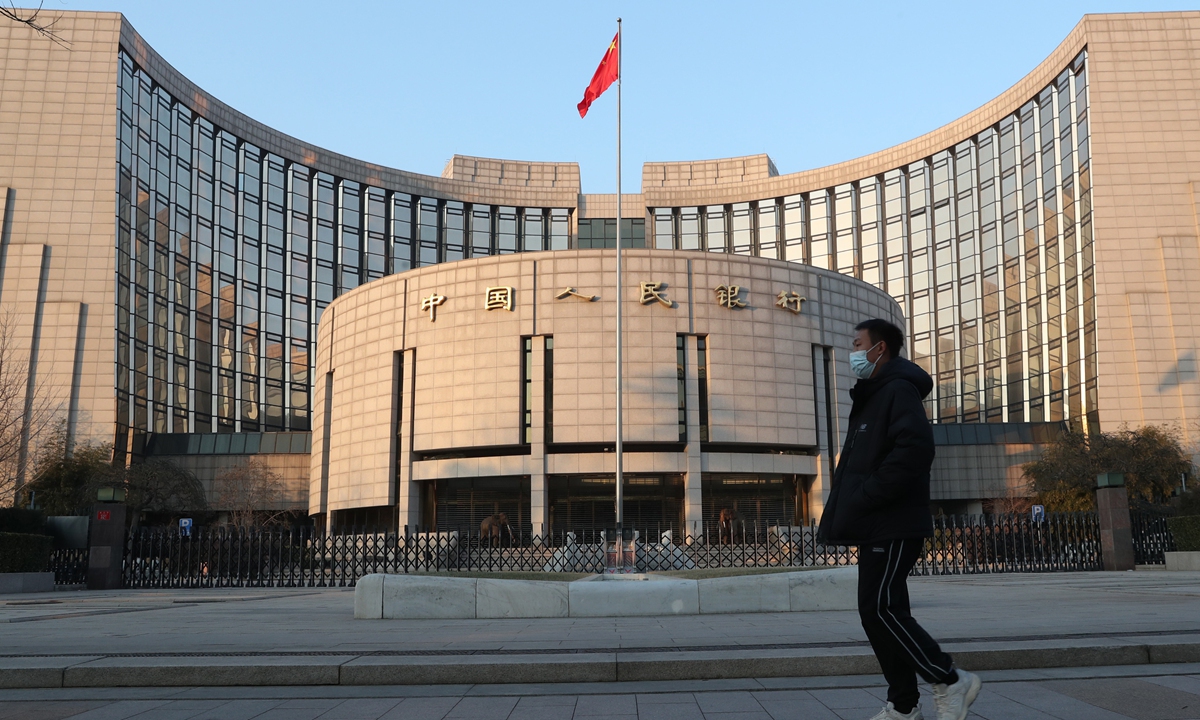
China's central bank Photo: CFP
The People's Bank of China (PBC), China's central bank, on Monday rolled out a wide variety of support measures ranging from refinancing quotas to increasing loans, as the country ramps up efforts to relieve the economic burden caused by the sudden resurgences of the coronavirus in multiple cities.
Many of those policies are aimed to aid people and industries directly battered by the coronavirus outbreak such as logistics. But some experts said that the financial measures could function better in tandem with fiscal policies such as increasing government spending, to reactivate a cooling market.
On Monday, the PBC announced 23 steps to provide financial services for socioeconomic development and coronavirus prevention and control. The measures were rolled out along with the State Administration of Foreign Exchange (SAFE).
A major focus is helping people to get loans from banks. The central bank noted that it would continue to use the 400 billion yuan ($62.8 billion) relending quota that was originally used to support small and micro-credit loans. It added that the relending quota could be increased further if necessary.
The PBC said that it would use multiple monetary policy tools including open market operations, the Standing Lending Facility and other means to provide ample liquidity to the market. It would also prevent banks from restricting or stopping loans to help companies withstand the impact of the coronavirus.
Many of the measures are directly targeted at supporting companies or people that are taking a serious hit from the COVID-19 resurgence.
For instance, financial institutions were asked to offer loan extensions to logistics companies or drivers that have difficulties paying back loans. The country will also increase credit support to aviation companies and airports with new credit lines.
For people who are infected with the virus or who lose their income temporarily because of the epidemic, the banks are asked to support them by adjusting loan repayment arrangements, such as postponing their payment of mortgage loans.
The PBC also listed measures to provide monetary support for sectors like agriculture, energy and 5G.
Experts said that the government notice has made it very clear in terms of how to better ease the burden of industries, groups and individuals from the epidemic hit.
"The downward pressure faced by the economy is significant. If China does not come up with policy stimulus to cope with the situation, then it will be very difficult to achieve the 5.5 percent GDP growth target," Xi Junyang, a professor at the Shanghai University of Finance and Economics, told the Global Times.
Xi said the most urgent task for the government is to alleviate difficulties faced by companies because of COVID19, and those measures would help relevant companies ease their burden by filling their short-term capital needs.
Zhao Xijun, co-director of the Capital Market Research Institute at Renmin University of China, told the Global Times on Monday that the highlight of the notice is its actual support for industry groups by encouraging local banks to increase loans to small and micro-sized enterprises.
"For consumers, those who cannot repay their housing loans in a timely manner due to the epidemic may not be included in the personal default system," Zhao said, another highlight of the notice in easing public concerns.
Experts said that monetary policy alone can't lift China out of its economic dilemma, as the major problem isn't a lack of liquidity but the scarcity of viable investment projects and banks' concern over potential bad loans in the coming months.
"It's difficult for lending to increase drastically," Xi said. He added that the government should roll out more fiscal support policies to stimulate the economy, such as by accelerating government investment in infrastructure projects, and one feasible method is to expand the budget deficit.
China has set a target of 2.8 percent for 2022's financial deficit, which Xi said might be insufficient to deal with the grave economic challenges.
Zhao said that the most important thing is to ensure the normal resumption of work and production of enterprises.
"The extent to which the 400 billion yuan relending quota can play a role in lifting the economy depends on the recovery of production and factory operations after the epidemic is put under control," Zhao said.
According to the PBC, the central bank had transferred profits of about 600 billion yuan to the central government as of mid-April. The money is mainly used for tax refunds and local government fiscal transfers, it said.




